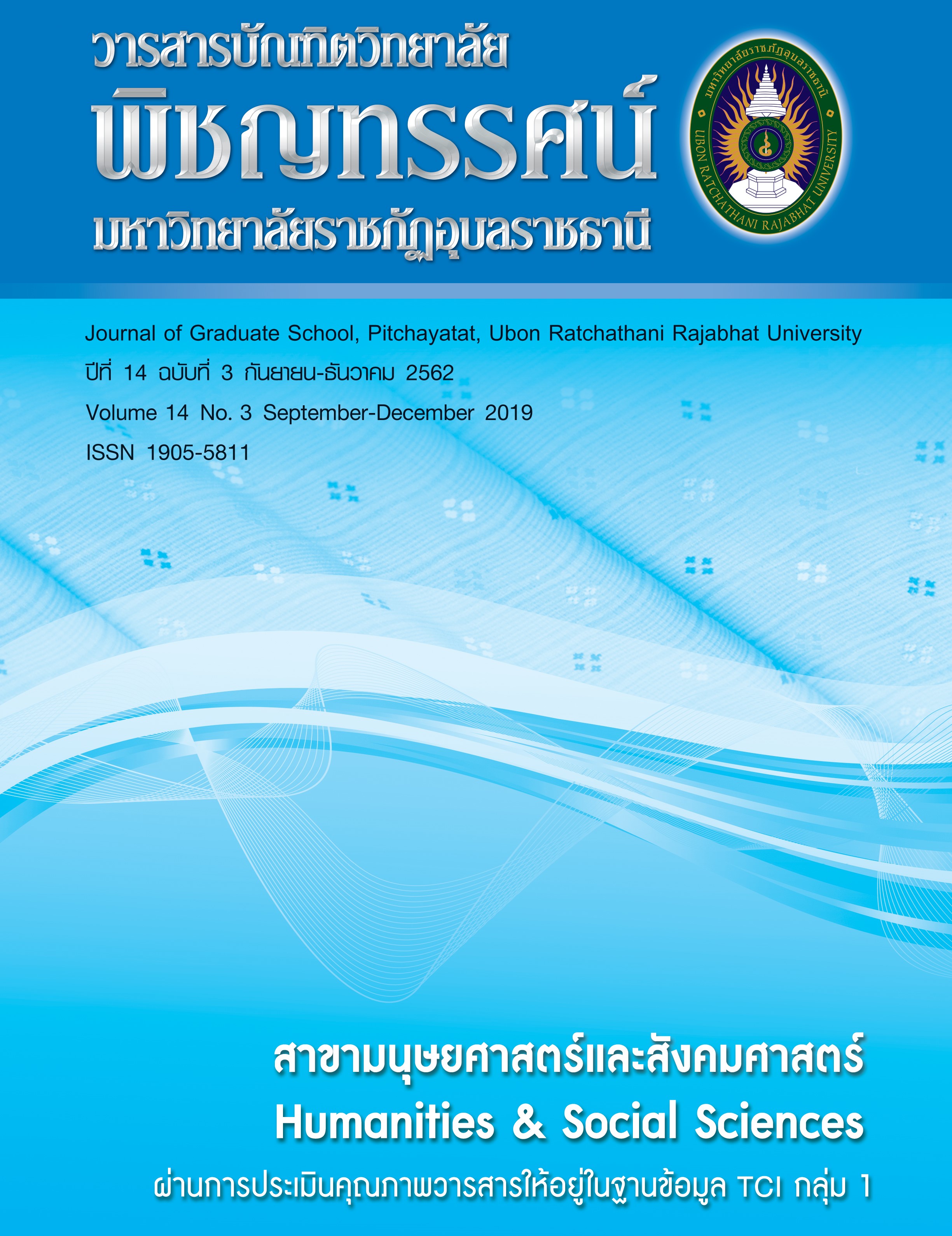การประเมินความต้องการจำเป็นในการดำเนินงานการประกันคุณภาพการศึกษา ระดับหลักสูตรสาขาครุศาสตรบัณฑิต
คำสำคัญ:
การประเมินความต้องการจำเป็น, การประกันคุณภาพการศึกษา, หลักสูตรสาขาครุศาสตรบัณฑิตบทคัดย่อ
การวิจัยครั้งนี้มีวัตถุประสงค์ 1) เพื่อศึกษาสภาพที่เป็นจริงและสภาพที่คาดหวังในการดำเนินการประกันคุณภาพการศึกษาระดับหลักสูตรสาขาครุศาสตรบัณฑิต 2) เพื่อประเมินความต้องการจำเป็นในการดำเนินการประกันคุณภาพการศึกษาระดับหลักสูตรสาขาครุศาสตรบัณฑิตตัวอย่างได้แก่อาจารย์ประจำ สังกัดคณะครุศาสตร์ มหาวิทยาลัยราชภัฎ จำนวน 361 คน ได้มาโดยการสุ่มแบบหลายขั้นตอน เครื่องมือที่ใช้ในการวิจัย เป็นแบบสอบถาม จำนวน 1 ฉบับ แบบมาตราส่วนประมาณค่า 5 ระดับ ค่าความเชื่อมั่น เท่ากับ .975 สถิติที่ใช้ในการวิเคราะห์ข้อมูลคือร้อยละ ค่าเฉลี่ย ส่วนเบี่ยงเบนมาตรฐาน วิเคราะห์และจัดลำดับความต้องการจำเป็นโดยใช้สูตร Needs Index แบบปรังปรุง PNI Modified
ผลการวิจัยพบว่า
- สภาพที่เป็นจริงในการดำเนินการประกันคุณภาพการศึกษาระดับหลักสูตรสาขาครุศาสตรบัณฑิตในภาพรวมมีค่าเฉลี่ยอยู่ในระดับมาก และสภาพที่คาดหวังในการดำเนินการประกันคุณภาพการศึกษาระดับหลักสูตรสาขาครุศาสตรบัณฑิตในภาพรวมมีค่าเฉลี่ยอยู่ในระดับมากที่สุด
- ความต้องการจำเป็นในการดำเนินการประกันคุณภาพการศึกษาระดับหลักสูตรสาขาครุศาสตรบัณฑิต มีค่า PNI Modified อยู่ระหว่าง 0.275 ถึง 0.550 เมื่อพิจารณาเป็นรายข้อ เรียงลำดับความต้องการจำเป็นจากมากไปหาน้อย 3 ลำดับแรก พบว่า ความต้องการจำเป็นลำดับที่ 1 คือ หลักสูตรดำเนินการปรับปรุงประบวนการจัดการเรียนการสอนเพื่อพัฒนาทักษะผู้เรียนในศตวรรษที่ 21 (PNI Modified = .550) รองลงมาคือ หลักสูตรดำเนินการพัฒนาอาจารย์ด้านการจัดการเรียนการสอนในศตวรรษที่ 21 (PNI Modified = .520) และหลักสูตรดำเนินสำรวจความพึงพอใจของอาจารย์และนักศึกษาต่อสิ่งสนับสนุนการเรียนรู้(PNI Modified = .513) ตามลำดับ
เอกสารอ้างอิง
คณะกรรมการการอุดมศึกษา, สํานักงาน. คู่มือการประกันคุณภาพการศึกษาภายในระดับอุดมศึกษาฉบับปีการศึกษา 2557. กรุงเทพฯ: ภาพพิมพ์, 2558.
คณะกรรมการการอุดมศึกษา, สำนักงาน. สถิติข้อมูลการศึกษา. (ออนไลน์) 2560 (อ้างเมื่อ 24 มกราคม พ.ศ. 2561). จาก https://www.info.mua.go.th/information/show_all_statdata_table.php?data_show=4.
เจริญวิชญ์ สมพงษ์ธรรมและคณะ. “รายงานการวิจัยฉบับสมบูรณ์ เรื่อง การศึกษาแนวโน้มคุณลักษณะของครูไทยในทศวรรษหน้า (พ.ศ. 2562),” การศึกษาวิจัยเกี่ยวกับการพัฒนาวิชาชีพและผู้ประกอบวิชาชีพทางการศึกษา. กรุงเทพฯ: โรงพิมพ์ สกสค. ลาดพร้าว, 2554.
บุญเรียง ขจรศิลป์. วิธีวิจัยทางการศึกษา. กรุงเทพฯ: ศูนย์หนังสือจุฬาลงกรณ์มหาวิทยาลัย, 2543.
พงศ์เทพ จิระโร. การพัฒนาระบบการประกันคุณภาพภายในสำหรับหารศึกษาเฉพาะทางกองทัพเรือ. วิทยานิพนธ์ครุศาสตรดุษฎีบัณฑิต จุฬาลงกรณ์มหาวิทยาลัย, 2546.
เลขาธิการสภาการศึกษา, สำนักงาน. สถานภาพการผลิตและพัฒนาครูไทย. กรุงเทพฯ: บริษัท พริกหวานกราฟฟิค จำกัด, 2558.
สุวิมล ว่องวาณิช. การประเมินความต้องการจำเป็น.กรุงเทพฯ: โรงพิมพ์แห่งจุฬาลงกรณ์มหาวิทยาลัย, 2548.
Banwet, D. K. and Datta, B. “A study of the effect of perceived lecture quality on post-lecture intentions,” Work Study. 52,5 (cited March 2003): 234-243.
Partnership for 21th Century Skills. P21 Framework Definitions. (online) 2015 (Cited 2018 August 19). Available from : https://www.p21.org/storage/ documents/docs/P21_Framework_Definitions_New_Logo_2015.pdf.
Taro Yamane. Statistics : An Introductory Analysis. 2nd ed. New York: Harper & Row, 1973.
Winch, C. Quality and education. Oxford, United Kingdom: Blackwell, 1996.
Witkin, Altschuld. Planning and Conducting Needs Assessments : A Practical Guide . London: Sage Publications, 1995.
ดาวน์โหลด
เผยแพร่แล้ว
รูปแบบการอ้างอิง
ฉบับ
ประเภทบทความ
สัญญาอนุญาต
บทความทุกเรื่องได้รับการตรวจความถูกต้องทางวิชาการโดยผู้ทรงคุณวุฒิภายนอกอย่างน้อย 3 คน ความคิดเห็นในวารสารพิชญทรรศน์เป็นความคิดเห็นของผู้นิพนธ์มิใช่ความคิดเห็นของผู้จัดทำ จึงมิใช่ความรับผิดชอบของวารสารพิชญทรรศน์ และบทความในวารสารพิชญทรรศน์สงวนสิทธิ์ตามกฎหมายไทย การจะนำไปเผยแพร่ต้องได้รับอนุญาตเป็นลายลักษณ์อักษรจากกองบรรณาธิการ





